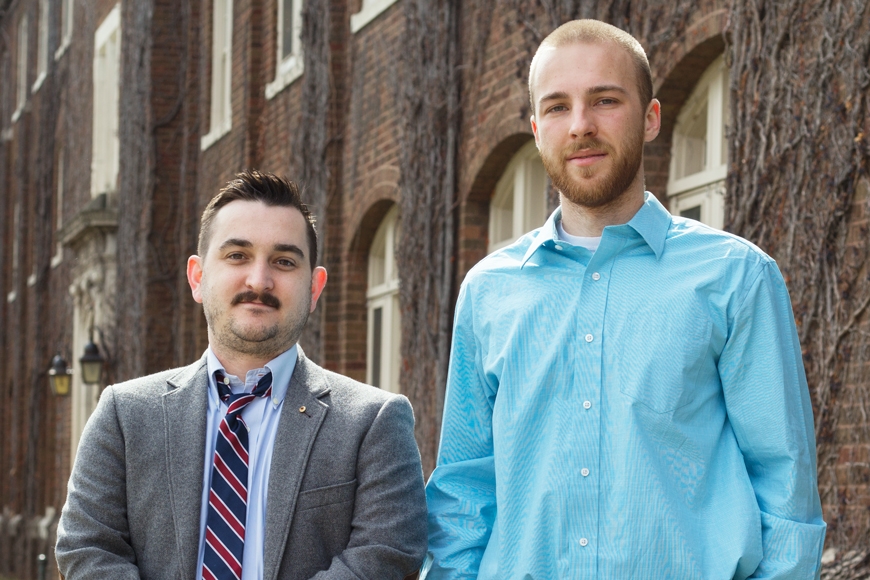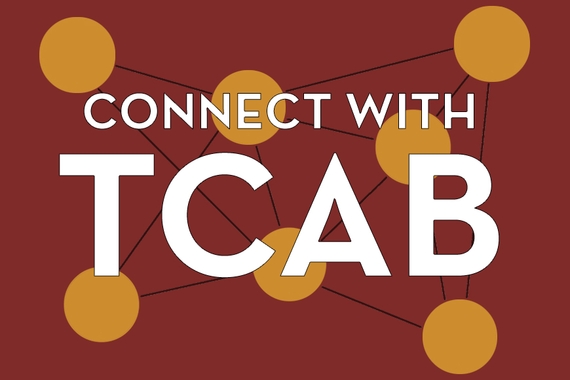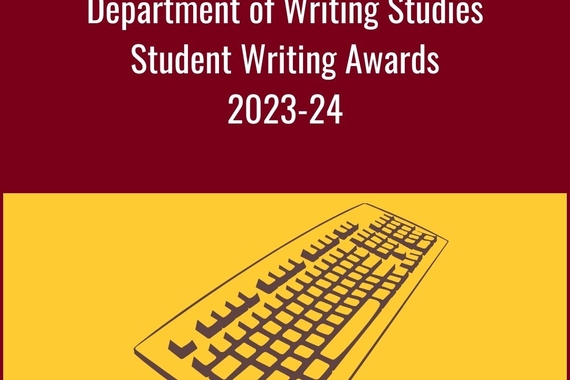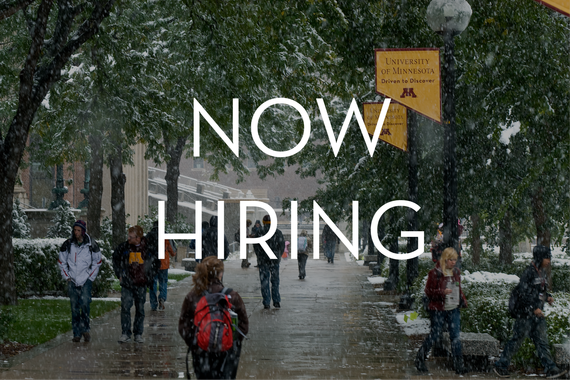A Story of Collaboration
Great teams always have an origin story. While working with others can sometimes be a struggle, the research collaboration between this instructor and student has been a rewarding partnership.
Origins and Ideas
In the summer of 2016, Alexander Champoux, a candidate in the Doctorate in Rhetoric, Scientific and Technical Communication (RSTC) program, and Eric Wisz, an undergraduate in the Technical Writing and Communication undergraduate program, met in a classroom for the course Technical and Professional Writing (WRIT 3562). Wisz says that at first he “honestly wasn't too jazzed about it.” He had expectations of writing memos and technical descriptions.
But Champoux took a different approach to the course, applying critical rhetoric and composition scholarship to technical writing. One of the ways he does this is by “supplementing the textbook with readings from writing studies more broadly so that students have a starting point if they want to engage more critically.”
Instead of leaving right after the class was done, Wisz began staying back to continue discussing the texts, so Champoux recommended even more readings to him. As the semester went on, Champoux found that the more he talked with Wisz and read his work, the more he saw their overlapping interests.
Wisz’s strong engagement with the class allowed the pair to bond over the similarities they had. They shared an admiration for Department of Writing Studies professor Dr. Pat Bruch’s “ideas as a scholar and . . . contagious positivity as an instructor.” Bruch, who was Champoux’s advisor and dissertation committee chair and a committee member for Wisz’s thesis, focuses his work on critical language pedagogies and teacher development, which are some of the topics that Champoux and Wisz study.
Wisz’s final research project surveyed English professors at the University of Minnesota about the learning objectives that they incorporate in their program and “whether those objectives can be arrived at with non-canonical texts (specifically hip-hop).” His project featured two of the texts that Champoux shared—Susan Miller's Textual Carnivals and Jane Tompkins' Sensational Designs.
Launching CWSO
During the following semester, a group of scholars in creative writing, English literature, and rhetoric/composition banded together to form the Creative Writing Studies Organization (CWSO), and published the inaugural issue of The Journal of Creative Writing Studies (JCWS).
Because Wisz had prior knowledge and experience with the various texts—Textual Carnivals, Sensational Designs, and many others—that Champoux had hoped to use for the issue, Champoux reached out to Wisz to collaborate on an article. Their goal is to re-examine the ways that teaching and learning happen in English-related fields. “The idea of our article is to bridge the gap and open a dialogue and exchange of ideas between the field of creative writing and the field of rhetoric and composition,” Wisz explains.
Champoux uses critical theory to study the different approaches to composition, literacy, pedagogy, and writing program administration, especially pertaining to combatting monolingualism and analyzing language values. “The CWSO is proposing a critical reexamination of what ‘creative writing’ scholarship looks like, how teachers of creative writing are trained to do pedagogical work,” he says, ”and how the current system has resulted in certain inequalities and disparities in representation.”
After incorporating rhetoric and composition scholarship with English literature studies for his research project in Champoux’s course, Wisz developed insight as to how rhetoric and composition can be used in the field of creative writing studies.
Wisz’s final project for WRIT 3562 proposed a new way of teaching English literature, so they knew that together they could write something important for JCWS.
The Collaboration
“Before I even started, I knew that working collaboratively with someone else would be valuable,” Champoux says.
Champoux believes that collaboration and teamwork can keep the writing process going. Working together makes team members accountable to each other. If one is struggling with motivation, the other can step up, and if they’re both struggling, they can brainstorm together.
“Alexander and I bounce ideas off of each other and notice possible counterarguments and weaknesses in each others' ideas and in how we present these ideas, all of which helps to develop our work.” Wisz says. One of the things they often discussed was how to present their ideas in a way that would be received well and taken seriously, because rhetorical composition is sometimes seen as less expressive than creative writing.
While the pair is working to change the academic world through their research, they are already changing it for themselves. “I gain so much from the knowledge and perspective that [Wisz] brings to our project. . . . If we reach out to undergrads as research partners more, then we can share our authorization with them, and further support them in being recognized as serious academics,” Champoux says.
As he did in the classroom, Champoux respected Wisz’s theories during the project. “[Champoux] always listened to my thoughts and ideas and took them seriously. . . He knows more than me about the field of rhetoric and composition, but he values the ideas that I bring. I think this attitude has only made our collaboration stronger,” Wisz recalls. Their ability to communicate as equals throughout the project ensured that every idea was fully considered to create the best work possible.
They presented their work at the 2017 Minnesota Writing and English Conference, where it was well received.
The End? Not Yet.
Although both are focusing on different things—Alexander working on his dissertation and teaching at the University and Metro State and Eric preparing for graduate school and working as a writing consultant and teaching assistant—they both have high hopes to work together again soon. In fact, Champoux is currently revising the article.
They plan to continue their research or start up a completely new project as Wisz begins his master’s degree in rhetoric and composition at the University of Central Florida in the fall. Whatever path they take, the two have already accomplished a lot for the TWC community.
This story was written by an undergraduate student in CLA.



